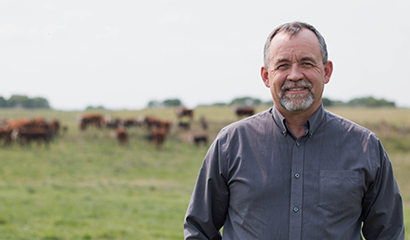
LFCE "a fantastic resource"
Veterinary researcher Dr. John Campbell shares his enthusiasm for the new Livestock and Forage Centre of Excellence (LFCE).
By HenryTye GlazebrookDr. John Campbell is a well known veterinarian and beef cattle scientist at the Western College of Veterinary Medicine (WCVM) who is leading a comprehensive, five-year survey of nearly 120 cow-calf herds in Western Canada. He has a vested interest in the quality and range of work being done in livestock research at the University of Saskatchewan (U of S). The LFCE will model all aspects of raising livestock on the Canadian Prairies and transform his own work and that of his peers.
Why do you support the idea of the LFCE project?
Our current facilities have been great, but they are really aging and in need of major infrastructure repair.
The LFCE is going to provide us with a modern, up-to-date facility. When you look at our combined resources from the U of S colleges of agriculture and bioresources, engineering and veterinary medicine, there’s probably as many people working on beef cattle research here [in Saskatchewan] as anywhere in Canada for sure — rivalling many places in North America.
What does the LFCE mean to you personally?
It will be a great resource for lots of our different projects. We’re already involved in studying the current herds, but by having a new facility and a modern-type cow-calf herd near Saskatoon, we will have the real ability to conduct lots of different projects — animal welfare or reproductive research or whatever it may be. It’s just an amazing resource for us to have close by.
It’s going to be a great facility for the students, too, in terms of a teaching resource and a place to run our labs and hands-on, practical laboratories for cattle handling and learning to deal with beef cattle.
Are there any research projects you’re planning to work on with these new facilities?
We’ve been working on welfare projects associated with castration of calves, looking at pain control and mitigation of pain with some of the common painful procedures. Those kinds of projects would be that much easier to do with LFCE. In the last couple years, I’ve had to use both herds at the Western Beef Development Centre and Goodale Research Farm. I was able to get research done at those facilities too but having it all in one place will make this much better for those kinds of projects.
Will the LFCE host a larger herd than what’s currently available?
We’re hoping that it will be the size of the two herds combined so that we’re not going to lose any capacity to do research.
How will the LFCE affect the next generation of cattle producers?
It will have an impact on them as well as the next generation of veterinarians. It will be used for labs for both the vet students and animal science students. It’s going to be a great resource for them to have hands-on laboratories and practical teaching. It will be used as an extension centre and resource. The Western Beef Development Centre has been widely involved in running field days and extension days for producers. That’s going to continue on at the LFCE.
It will be a great resource for students. I can envision that we could have some calving rotations for the vet students and other opportunities out there, all of which would be awesome for students to get some hands on experience.`
How will the LFCE serve the Canadian cattle industry?
It will be a fantastic resource for producers. We are already the second-biggest province in terms of cow-calf production — just a little bit less than Alberta now and climbing all the time. We’re at the real centre of beef cattle production in Western Canada. The information that we’ll be able to generate here will help us to stay at the forefront of the developments that need to be figured out, both in terms of production and sustainability. There are important animal welfare and food safety questions that have to be answered so we can continue to operate in today’s society and make sure we’re doing things the right way.

